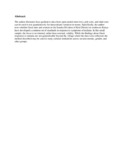| dc.description.abstract | The author illustrates how qualitative data from open-ended interviews, pile sorts, and triad sorts can be used to test quantitatively for intracultural variation in norms. Specifically, the author tests whether Gusii men and women in the Suneka Division of Kisii District in southwest Kenya have developed a common set of standards in response to symptoms of malaria. In this small sample, the focus is on internal, rather than external, validity. While the findings about Gusii responses to malaria are not generalizable beyond the village where the data were collected, the method described may be used to study cultural similarities across socioeconomic, gender, and other groups. | en |

